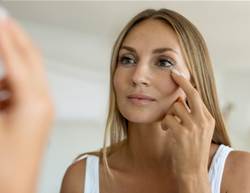Whether you discovered your first silver strand or you’ve decided to let your natural hair colour shine, it’s normal to find yourself wondering, why does hair turn grey? And while we’ve touted ways to embrace and style your grey hair, the science behind why white and grey strands occur is actually quite interesting.
We’ve all heard the thought that stress causes grey hair, and in fact, recent studies suggest a link between the two. But, there are so many more reasons why your locks might be getting lighter. In fact, general ageing and even your genes could have a lot more to do with your silver strands than you might think. And underlying health conditions like vitamin deficiency or alopecia could even be a factor.
Ahead, we asked dermatologists to explain why hair turns grey, what causes premature greying, and if it’s possible to reverse grey hair.
Why does hair turn grey?
“Grey hair is really hair with less melanin, what gives skin and hair colour,” explains dermatologist Dr Azadeh Shirazi. “While white hair completely lacks [melanin]. With ageing, there’s a gradual decline in the number of stem cells that mature to become melanin-producing cells. These cells may wear out, become damaged, or lose the support systems meant to keep them working.”
Apparently, our genes are also a factor. “Over time as we age, our cells do not produce as much melanin resulting in grey hair (decreased melanin) or white hair (absence of melanin),” explains dermatologist Dr Janiene Luke. “There is a genetic component and this can be seen in those who exhibit premature greying (that occurs earlier in life when one is in their 20s or 30s). However, hair growth and hair pigmentation are highly regulated processes with multiple genes and cell signalling molecules involved, where any disruption of these processes can lead to grey hair.”
What’s on our scalp, or rather, hair bulb, also plays a part, according to dermatologist Dr Marisa Garshick. “As we age there is a build-up of hydrogen peroxide in the hair bulb which can destroy the pigment-producing cells, leading to decreased melanin and grey hair.”
What causes grey hair at an early age?
So basically, as we age our cells produce less melanin, which leads to grey hair. But, if you go grey much earlier than anticipated (say, at age 20 instead of in your late 30s or 40s), there might be something more at play.
Premature greying is thought to be genetic, according to Dr Garshick, and “may even be related to a specific gene known as interferon regulatory factor 4 (IRF 4) which may help to regulate melanin production.” But there are a number of health conditions that could lead you to go grey, too.
Illnesses that cause grey hair
According to all of the experts we spoke with, the following causes grey hair:
Is it possible to reverse grey hair?
Unfortunately, there is not much to do to stop greying when it is part of the normal ageing process, explains Dr Luke. “Early on in the process, however, if there are reversible causes leading to greying (i.e. smoking, nutritional deficiencies), people can try to make lifestyle modifications such as quitting smoking and maintaining a healthy diet packed with nutrients and antioxidants to help protect the cells involved in hair pigmentation.”
But, Dr Shirazi thinks that the future might hold some options. “Possibly in the future as new studies show by stimulating stem cells back into action, pigment-producing cells can be revitalised to reverse grey hairs.”










